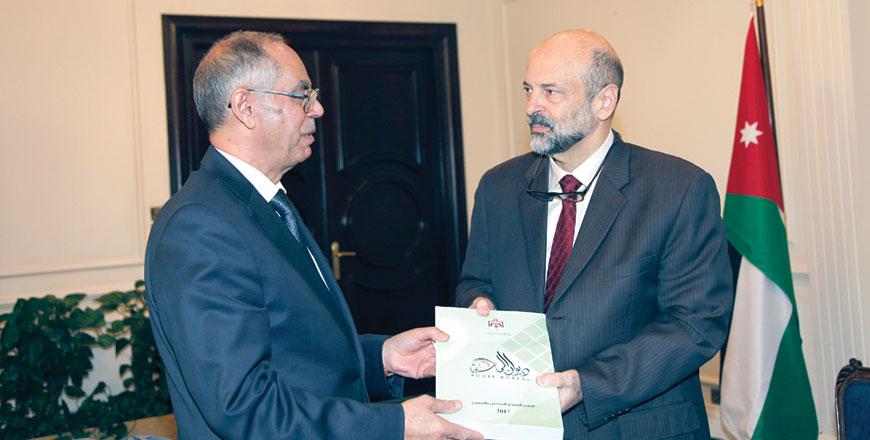You are here
Oversight agency reports gov’t violations, PM vows action
By Maram Kayed - Nov 01,2018 - Last updated at Nov 01,2018

Prime Minister Omar Razzaz receives a copy of the 2017 Audit Bureau report from the agency’s chief Abed Kharabsheh on Thursday (Petra photo)
AMMAN — Multiple financial and ethical violations by the government were revealed on Thursday, as the Audit Bureau released a comprehensive report of all government entities’ financial records for the year 2017.
The report was made available to the public after the Lower House Speaker Atef Tarawneh requested its publication on the chamber's website, a move which, he said in a meeting on Wednesday, was “part of the transparent strategy he believes the bureau should adopt”.
The 2017 audit showed “multiple financial irregularities and violations”, which include 69 instances of financial corruption and fraud amounting to around JD2.3 million.
These violations were attributed to accountants, treasurers and tax collectors, who “manipulated records and receipts”.
On Thursday, Prime Minister Omar Razzaz received a copy of the report and pledged that the government would rectify all violations listed directly through Cabinet decisions or through referring those with suspicion of corruption to the Jordan Anti-Corruption Commission, the Jordan News Agency, Petra, reported.
He also voiced the government's keenness on expanding the jurisdiction of the bureau and enhancing its independence to perform its monitoring duties, Petra reported.
Later in the day, upon directives from Razzaz, a team tasked with reviewing the violations in the report embarked on its mission by contacting relevant institutions.
The team contacted 80 parties, and asked them to respond to the report within one week, Petra added.
In a section on the Jordan Free Development Zones Group, the report said that a 310kg agricultural plane for aerial application of pesticides has been missed.
The report also said that the Jordan Radio and Television Corporation (JRTVC) bought 33 Arabic films at a total cost of JD42,000 although it already had them in its library.
Some 126 instances of government employees using state-owned vehicles for their own use outside working hours were recorded, while 1,152 other violations were related to vehicle misuse by employees.
Another violation, which caused a row on social media was the sale of 294 dunums of the state-owned land by a government employee to his brother, using a fraudulent contract dating back to 1972 to “verify” the process.
The Ministry of Agriculture was also reported for spending JD1.5 million on two “training workshops” for a project that auditors couldn’t trace records for, speculating that there was “manipulation of the project’s funds, as there is no record of any money left for the project itself after the workshops were held”.
Heads of different government bodies and sectors were noted to have “received more than their assigned privileges”, with a former president of the Social Security Corporation receiving more than JD69,000 in raises and the current president of Yarmouk University being given more than JD3,000 in compensation for phone calls.
The report highlighted “dubious performance” by several government departments such as the admission of over 3,800 kilogrammes of coffee beans into the Kingdom, despite the fact that they were contaminated by insects and dust at a ratio above the permitted rate.
The beans were admitted into the country and sold for profit after an employee of the Jordanian Food and Drug Administration gave the clearance to customs “without sufficient explanation”.
A similar instance included the clearance of JD167,800 worth of pistachios that were revealed to be “containing cancerous components”. The shipment was admitted into the country with no explanation in the custom’s books.
According to the bureau’s website, the law requires presenting an annual report to the Lower House, which would outline any irregularities, deficiencies or weaknesses in the performance of the audited entities. The report should be presented at the beginning of the Parliament’s ordinary session, and at any other time the House of Representatives may require.
The bureau oversees the revenues, expenditures, deposits, advances, loans, settlements and warehouse accounts for all government ministries, departments, agencies, public official institutions and independent official entities.
It also oversees the municipal boards, syndicates, professional unions, charities and voluntary bodies, as well as companies where the government has 50 per cent stake or more.
Related Articles
AMMAN — Prime Minister Omar Razzaz referred nine new violations listed in the Audit Bureau’s 2017 report to the Jordan Integrity and Anti-Co
AMMAN — Prime Minister Omar Razzaz on Monday referred 30 new violations in a number of municipalities listed in the Audit Bureau's report to
AMMAN — Prime Minister Omar Razzaz instructed the committee entrusted with examining the violations contained in the Audit Bureau’s report t















